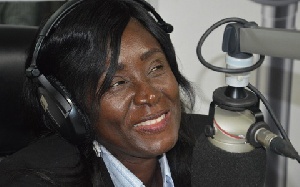 Gifty Twum-Ampofo, Deputy Minister for Gender Children and Social protection
Gifty Twum-Ampofo, Deputy Minister for Gender Children and Social protection
Mrs Gifty Twum-Ampofo, the Deputy Minister for Gender Children and Social protection, has called on the ECOWAS Member States to increase investment in women and the youth in order to eliminate financial and cross-border criminalities.
She said the present disparities in gender and high rate of youth unemployment in West Africa was a recipe for increased cross-border criminal activities, which included human and drug trafficking, cybercrimes, fraud and terrorism, and had the potential of affecting a country’s development in so many ways.
“We all know that financial and cross-border crimes which include human and drug trafficking, cyber-crimes, fraud and terrorism affect a country’s development in so many ways and in such situations women, who are in the majority, suffer most”.
She said to tackle the issue in an all-inclusive manner would require critically addressing the disparities in gender, the high rate of youth unemployment, ensuring improved investment in quality education in order to produce the right set of people for development, and strengthening the cross-border law enforcement agencies, so as to enable them to effectively check the frequent crimes that impeded its external relations and development.
Mrs Twum-Ampofo, who was addressing an ECOWAS Regional forum on “Gender and Youth dimensions of financial and cross-border criminality in West Africa”, in Accra on Monday, said transnational crimes take advantage of globalization, trade liberalization and exploding new technologies.
She said there is the need to forge a strong alliance within the West African Sub-region to effectively fight the aforementioned crimes which threatened its security and stability.
The three-day forum, which was jointly organised by the Inter-Governmental Action Group Against Money Laundering in West Africa (GIABA) and the ECOWAS Gender Development Centre (EGDC), would create an opportunity for participants share experiences and best practices with a view to defining a comprehensive framework to mainstream gender and youth dimensions into the fight against financial crimes and related issues in the Sub-region.
Mrs Twum-Ampofo said Ghana has taken the needed steps to mitigate the incidence of financial and cross-border crimes by putting into place certain institutions and legal frameworks such as the Narcotics Control Board, the Anti-Human Trafficking Unit of the Ghana Police Service, as well as the Human Trafficking Unit under the Ministry of Gender, Children and Social Protection.
Government, she said, had also enacted the Human Trafficking Act, 2005 (Act 694) which proscribed, punishes perpetrators and provided for the rescue, rehabilitation and reintegration of victims, and ensured continuous education and sensitization on the nature, hazards associated with the phenomenon, as well as prosecution of offenders and victim protection. Other initiatives included capacity building for some stakeholders including the Police, Immigration, the Customs Division of the Ghana Revenue Authority, Navy, Judiciary and Prosecutors among others.
She commended GIABA and the EGDC, for the forum and urged it to sustain the momentum of the game to complement each other’s effort in the spirit of achieving the 2030 Sustainable Development Goals.
Mr Brian Anku Sapati, the Deputy Director General of GIABA, said ECOWAS had envisioned to “create a borderless, peaceful, prosperous and cohesive region built on good governance, and where people had the capacity to access and harness its enormous resources through the creation of opportunities for sustainable development and environmental preservation by the year 2020.
He said it considered peace and security as transnational and cross-sector issues, and solid foundations for the vision that demanded greater commitment and actions by governments and stakeholders in the region.
He explained how members of organised crimes groups through their sophisticated method were able to reintroduce the illegally acquired proceeds back into the formal economy as ‘clean money’, and also often seek to evade detection, arrest, and punishment by operating across international borders.
Mr Sapati said the inability of any one State to effectively address these threats translated itself into an overall weakness in the international regime of criminal justice administration, saying international initiatives required countries to adopt and effectively implement standards to fight money laundering and terrorists financing, with the view to taking the profit out of crime and applying appropriate sanctions to deter criminal elements from perpetrating their nefarious activities.
He said the forum was a clear demonstration of the commitment of GIABA and the EGCD to work in synergy to realise the vision of ECOWAS, expressing the hope that the outcome would form a solid foundation for the control of transnational organised crime in the region.